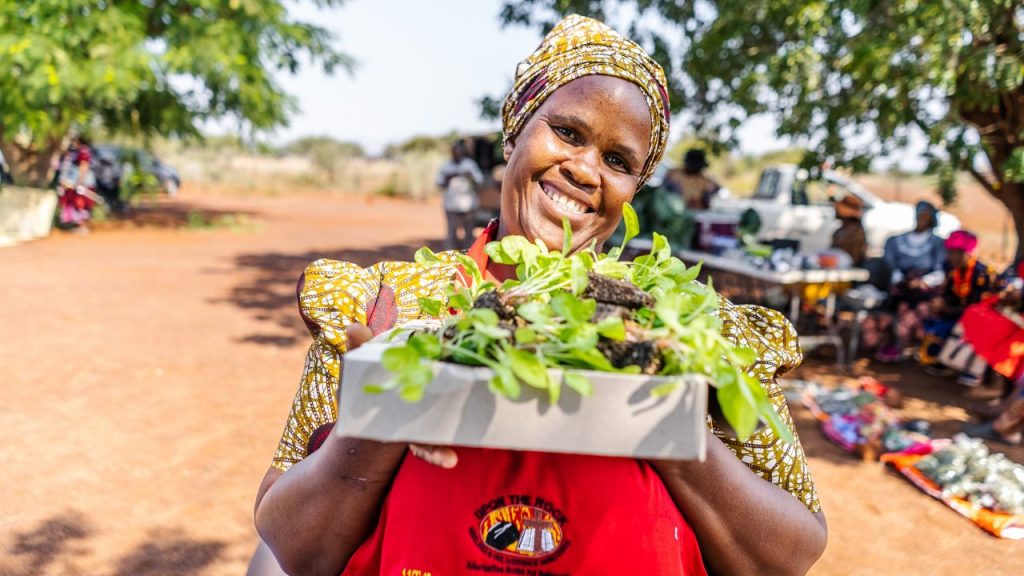Nederburg is once again championing local tastes and talents, this time by supporting a self-sustaining, community-based programme to grow, distribute, and cook with sometimes forgotten indigenous ingredients. The Paarl winery has teamed up with Harvesting Heritage, a People, Planet, Plate project that also involves celebrated food anthropologist, cultural historian and chef Anna Trapido.
Harvesting Heritage seeks to protect heritage crops and preserve indigenous knowledge systems. Central to its work is teaming up with veteran development organisation, SocioTech, to transfer skills in traditional eco-cultivation as well as in more contemporary marketing and trading, to create revenue streams and job opportunities, promote eco- and economic resilience and, at the same time, to encourage self-sufficient cultivation for nutritious, home eating.
The organisation collaborates with chefs, traditional councils and municipalities in reviving traditional tastes and cuisines and creating a market for them within the hospitality trade and for home consumption. It has already embarked on a range of projects in Gauteng, KwaZulu/Natal, Lesotho and the Western Cape.
Nederburg is working with Harvesting Heritage and SocioTech on a Limpopo-based initiative that will see small-scale farmers in the Greater Sekhukhune district grow crops for distribution and sale as far afield as Gauteng, where chefs are being invited to recreate and re-interpret classic recipes to expand South Africa’s already flourishing New African Cuisine.
Explains Nederburg’s marketing spokesperson Jackie Olivier: “Indigenous crops are an expression of place, just as wine can be of its terroir, when grown in an eco-respectful way that includes protecting the health of vineyard soils and environment. That’s what makes this collaboration so exciting.”
The winery and Harvesting Heritage co-presented a workshop in Pretoria in early March attended by members of the South African Chefs’ Association, who were introduced to some of these indigenous ingredients from morogo (different varieties like monawa and lerotho), bambara beans (perfect substitute for chickpeas) and okra, to nuts from the pips of marula fruit, marula jelly, lerotsi (melon), xigugu, zebra beans, African cucumber, and goat meat (chevon).
The chefs are being encouraged to raise public awareness of these foods and also experiment with them in developing exciting and nutritious new dishes to enjoy with Nederburg’s Heritage Heroes collection of wines (comprising an old-vine Chenin blanc, and a Rhône-style as well as Bordeaux-style red blend).
Those chefs keen to take up the further challenge of competing to produce a winning dish from these ingredients will feature in the Harvesting Heritage Culinary Competition on 27 May, also in Pretoria.
In addition to a judging panel of accredited chefs deciding, diners will vote with their palates. The dish to attract the most favour will earn the chef first prize, while a people’s choice chef will also be revealed. Just 240 tickets for the food (and glass of wine) are available, at a cost of R895 a head.
Indigenous food and wine pairing sessions, presented by Zinaschke Steyn, maker of Nederburg’s red wines, and sommelier Moses Magwaza, two-time winner of the coveted Eat Out Wine Service Award, will be offered at 12:00, 13:15 and 14:15, at a cost of R250 per person.
Harvesting Heritage is involving Limpopo farmers from the Strydkraal, Sekhukhune community, who are supplying the ingredients for the event.
Continues Olivier: “Nederburg has a history of inviting wine lovers to taste, learn and discover with us, from grape to wine style to pairing with food and occasion. This time, following the recent workshop, we are extending the invitation to chefs. We’re saying: ‘Taste our wines. Continue to taste and investigate Mzansi’s sometimes forgotten and now refound local ingredients; learn more, explore and make your own personal flavour magic for people to savour in the competition.’
“But alongside the competition, local, non-competing chefs will be preparing dishes with the same traditional ingredients at the same venue. They will be served market-style, at food stalls for other members of the public to try with our wines. We want to make the event as inclusive as possible and encourage chefs and diners to try these amazing traditional foods and make them part of their regular repertoire.”
Olivier says the Limpopo Harvesting Heritage and SocioTech initiative is the latest in Nederburg’s taste, learn and discover South African flavour journey. “Our I’ll Bring the Wine video series, hosted by chef Karen Dudley, travelled across the country to identify and highlight interesting foodies and foodie communities. Now we’re working with Harvesting Heritage and Anna to discover more local talent and bring it to the tables of more South Africans.”
Details
- Date: Saturday, 27 May 2023
- Time: 12:00 until 17:00
- Venue: Brooklyn Bridge, 570 Fehrsen St, Brooklyn, Pretoria
- Tickets: Book here
ALSO SEE: South African food markets for sunny days
Issued by August Collective
Feature image: Sheida Marsha with her indigenous foods / Supplied

